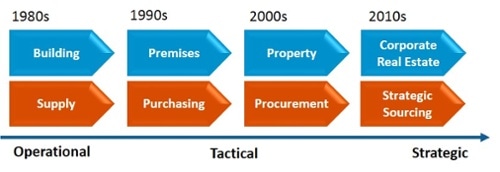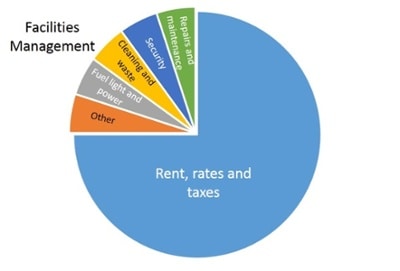Why procurement and property should stop butting heads

Tension and mutual frustration often characterise the relationship between Procurement and Property. But why? You both want to achieve greater value for your organisation, right?
Over the last five years there has been significant change in the relationship between the property and procurement functions.
In this article, Kent Stuart takes a light-hearted look at the issue and tries to reframe the property function for procurement professionals.
Evolution from ‘order takers’ to strategic players
While the department names may differ, the issue is the same; both property and procurement have evolved to become far more strategic.

Figure 1: Evolution in procurement and property functions
Despite this, both property and procurement have to constantly battle to demonstrate their value to the organisation, which one senior executive described as, “…the constant need to justify my existence!”
The extent to which property has been incorporated into a procurement discipline has never been more prevalent. However, the shifting sands between property and procurement are awash with game playing and territorial scuffles. Why? Lack of mutual understanding.
Here are the most frequent frustrations related to me by procurement heads and my observations.
What’s so special about property anyway?!
Every procurement manager has had internal clients tell them that ‘their area is special’ or that ‘you need to have 1,200 years of experience to understand my part of the businesses’. While most of that is bunkum, there are some aspects of the property function that are a bit different. Here’s the three most important to keep in mind.
1. People can die if you get it wrong
While it may be a big stretch depending on the business you’re in, the risks associated with WHS, hazardous substances and essential services to name but a few keep property managers awake at night.
What scares property people is the feeling that procurement are only focused on the costs when risk can be so much more expensive if you get it wrong.
2. Property markets are asymmetrical
More than any commonly purchased commodity, commercial real estate is all about what you’re prepared to pay and at what price someone else is prepared to sell. Knowledge is power and that knowledge can significantly shift the leverage in a negotiation. It is not uncommon for the supply/demand equation to shift by 25-30% in one quarter!
While this only relates to the cost of real estate (not your facilities management or project spend) remember that real estate costs are about 75% of your total property spend.

Figure 2: Typical property spend profile
3. Timing is everything
Property commitments are long term. It’s probably the last area of spend that requires planning over 10 and sometimes 20 years to get it right. So you’re timing into and out of major commitments will have a huge impact on your spend.
Property markets work on a cyclical clock of about 7 years between equilibrium to major oversupply and back to equilibrium. Of course this is different for each market (location) and for each type (commercial, retail, industrial) you’re buying and/or selling into. Yes it’s complicated, and that’s why there is a whole industry called ‘the real estate industry’ of experts wanting to feed off your businesses!
Where will the opportunities to improve come from?
Again, a very common question asked of procurement when they first look at property and one that is difficult to give a coverall answer to. We know that spend management relies on leveraging all four spend levers, Pay Less, Buy Less, Buy Cheaper and Buy Smarter.
Here’s what you need to look for to yield the best opportunities.
1. Aggregation to Pay Less
I know it’s chapter one of the procurement play book but one that can still be the source of quick easy wins. Remember to be careful when there is a qualitative or risk element to the service. It’s no good saving 10% on your engineering services if the emergency generator doesn’t kick in when the power goes out! That aside all non-real estate spend should be tested in this way.
2. Occupy less to Buy Cheaper
If there has been limited centralisation or, if the internal property team is not seen as strategic, there is a good chance that you can make significant cost savings through recasting the sites you occupy (how many and whether you own or lease them), the locations you’re in (does the cost of property in that location match your business needs) and how big your footprint is. This will take a little longer but will yield the best cost reductions in the long term.
3. Do less and buy more to Buy Smarter and Buy Less
Property can, like a lot of support functions, suffer from a lack of management time and attention. Be mindful of too many internal resources doing property work that can be readily supplied from a competitive market place. Whether it’s simply putting out to contract services traditionally delivered in-house (trades and maintenance tasks) or a full outsourcing, most organisations derive far greater value from doing less and buying more.
How to improve outcomes
Excluding direct procurement spend, property spend is usually the second (after staff cost) or third (after staff and IT costs) in terms of size. Improving the procurement of this spend can yield significant benefits. Many benefits will come without significant change or business risk. Others will require some subject matter knowledge and an understanding of how to procure smarter, cheaper and/or less.
Getting the relationship between property and procurement functions working better is key to leveraging the capabilities of both teams. Here are some options we have implemented to achieve this:
- Map processes: Where there is joint accountability and/or hand-offs make sure the processes are understood and used
- Create working teams: For specific sub categories (e.g. office fitouts) consider a working team with a procurement and property specialist who should be given a joint outcome of cost reduction
- Establish a category approach: Property people don’t think in terms of category management, however this is an area of spend that can benefit. My suggestion is to start with the goods, then work on the services
- Watch out for sharks: The procurement of space, whether leased or purchased, is a whole other area where you will need specialist advice either internal or external. Remember, no one wants to get their fingers bitten off by a shark!
By understanding why procurement gets push back from property and by dealing with their concerns about risk and market exposures, procurement will face far less resistance and achieve better savings far quicker than by butting heads!







 We are all about sharing our expertise to help you and your organisation be the best it can be.
We are all about sharing our expertise to help you and your organisation be the best it can be.